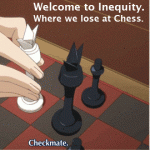 Graham Bowley’s pieces in The New York Times “Bailout Helps Fuel New Era Wall Street Wealth” and “Bonuses Put Goldman in Public Relations Bind” and The Financial Times editorial “Public Needs More Bang for Its Buck” are among a rash of recent articles describing a disparity that virtually everyone is experiencing. I find great cause for concern about the trend these pieces expose, as history shows that depriving many people of even the fundamental basics while a select few benefit astronomically never is sustainable. Frank Rich’s earlier op-ed “The Rabbit Ragu Democrats” highlights how the main relationships businesses currently cultivate are with lobbyists who can press their pet concerns with government officials. His is a cautionary tale of the adverse affects these highly lucrative relationships have not only on the citizens who take a hit from policies that are against their best interests but also, ultimately, on the very business leaders who pursued them.
Graham Bowley’s pieces in The New York Times “Bailout Helps Fuel New Era Wall Street Wealth” and “Bonuses Put Goldman in Public Relations Bind” and The Financial Times editorial “Public Needs More Bang for Its Buck” are among a rash of recent articles describing a disparity that virtually everyone is experiencing. I find great cause for concern about the trend these pieces expose, as history shows that depriving many people of even the fundamental basics while a select few benefit astronomically never is sustainable. Frank Rich’s earlier op-ed “The Rabbit Ragu Democrats” highlights how the main relationships businesses currently cultivate are with lobbyists who can press their pet concerns with government officials. His is a cautionary tale of the adverse affects these highly lucrative relationships have not only on the citizens who take a hit from policies that are against their best interests but also, ultimately, on the very business leaders who pursued them.
Michael Moore’s “Capitalism: A Love Story” describes phenomenal disparities of well-being among Americans and their access to the powers that affect their status. When I encourage people to see the film I explain that, even if they don’t agree with all of Moore’s conclusions, he exposes fundamental conditions about which we should engage in a vibrant discussion. Business, government and civic leaders need to make frank assessments of what could bring benefit to each of these respective sectors, not at the expense of any but instead with greater mutuality. The financial collapse and climate change are just two of the myriad inter-related global crises revealing that we sink or swim together.
In thinking about this, I re-read Eric Klinenberg’s 2004 review “To Have and Have Not” in The Washington Post of Michael Marmot’s book, “The Status Syndrome”. Klinenberg writes, “Extreme status disparities and social segregation at the national level undermine public health, whereas relative equality, social cohesion and strong public education systems promote collective well-being.” Marmot’s opening chapter “Some Are More Equal than Others” starts with a quote by W. Somerset Maugham, “Of all the hokum with which this country [America] is riddled the most odd is the common notion that it is free of class distinctions.” When the majority globally, and even so many in a nation as rich as the US, are lacking the most basic needs, we all pay the price. To grasp that extreme disparity adversely affects all of us, not just those who have the least, is not rocket science. As has happened historically – the Roman Empire, Louis XIV France, Apartheid South Africa, Marcos Philippines and countless other cultures of extreme disparity – the many without anything living among the few with so much can bring down seemingly rock-solid societies.
We see this happening at one end of the spectrum already: I was in DC at the same time when the “birthers,” “tenthers” and “tea-partiers” were there. While I disagree with what they stand for and am particularly alarmed by the vitriol with which they convey their beliefs, I am proud to live in a country where everyone has the freedom to express their opinion. I also understand that part of their anger is fueled by them not seeing the tangible benefits in their own lives of past or current political policies. As someone who has spent four decades working to create positive, sustainable, profitable change, I hope that those who fall more at my end of the political spectrum will exercise their right to promote social justice. I don’t believe this is just a “liberal feel-good” aspiration, but instead a basic necessity for everyone’s survival: those engaged in commerce and political leadership need it as much as those who really are feeling the pinch.
At Synergos, an organization that supports leaders and partnerships to change the systems that keep people in poverty, I spoke with a senior IBM executive. We discussed that businesses need to understand that their greatest asset is their relationships with stakeholders from all sectors – including civil society activists – in the communities and nations where they provide goods or services. All too often, they simply think of their corporate citizenship, if they think of it at all, in the narrowest sense possible: a kind of side-bar philanthropy. Instead, they must create and sustain deep relationships with advocates for social justice as key to their sustainable business model. At the very least, since they need a healthy, well-educated, financially capable customer base and work force, such initiatives in fact are good for business. We still must develop a compelling way to convey this to corporate leaders in bottom-line terms they can appreciate as “do-good-ism” is not a shareholder quarterly return they value. Bowley writes in his NYT piece that since Goldman Sachs partner Gus Levy proclaimed his company, “Greedy, but long-term greedy”…”these days that old dictum is being truncated to just “’greedy’…” We must find a way to tap into that desire for profit while increasing the scope of how profit is measured.
In working with visionary transformative leaders, I continue to search for the best ways to asses and articulate metrics that leaders in the business sector can understand as what they need to be profitable in the fullest sense. I encourage you to post your comments about this process.

